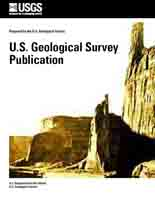The Winslow 30’ × 60’ quadrangle encompasses approximately 5,018 km2 (1,960 mi2) within Coconino and Navajo Counties of northern Arizona. It is characterized by gently dipping Paleozoic and Mesozoic strata that dip 1° to 2° northeastward in the southwestern part of the quadrangle and become nearly flat-lying in the northeastern part of the quadrangle. In the northeastern part, a shallow Cenozoic erosional basin developed about 20 million years ago, which subsequently was filled with flat-lying Miocene and Pliocene lacustrine sediments of the Bidahochi Formation, as well as associated volcanic rocks of the Hopi Buttes Volcanic Field. The lacustrine sediments and volcanic rocks unconformably overlie Triassic, Jurassic, and Cretaceous strata.
Beginning about early Pliocene time, the Little Colorado River and its tributaries began to remove large volumes of Paleozoic and Mesozoic bedrock from the map area. This erosional development has continued through Pleistocene and Holocene time. Fluvial sediments accumulated episodically throughout this erosional cycle, as indicated by isolated Pliocene(?) and Pleistocene Little Colorado River terrace-gravel deposits on Tucker Mesa and Toltec Divide west of Winslow and younger terrace-gravel deposits along the margins of the Little Colorado River Valley. These gravel deposits suggest that the ancestral Little Colorado River and its valley has eroded and migrated northeastward toward its present location and largely parallels the strike of the Chinle Formation.
Today, the Little Colorado River meanders within a 5-km (3-mi) wide valley between Winslow and Leupp, where soft strata of the Chinle Formation is mostly covered by an unknown thickness of Holocene flood-plain deposits. In modern times, the Little Colorado River channel has changed its position as much as a 1.5 km (1 mi) during flood events, but for much of the year the channel is a dry river bed. Surficial alluvial and eolian deposits cover extensive parts of the bedrock outcrops over the entire Winslow quadrangle.


